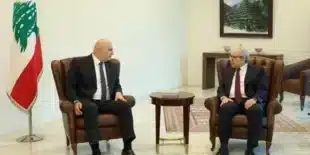Two Israeli airstrikes in central Beirut killed six people on Sunday, including a Hezbollah spokesperson.
Since the outbreak of the war on September 23, Israel has frequently bombed Beirut’s southern suburbs, known as a Hezbollah stronghold. However, strikes on central Beirut have been less common.
The first strike targeted the Ras al-Nabaa district, killing four people, including Hezbollah’s media relations chief Mohammad Afif, according to the group and Israeli military. The health ministry reported that the second strike in Mar Elias killed two people and injured 22, an increase from an earlier report of one dead and nine wounded.
The official National News Agency confirmed that Israeli warplanes struck the densely populated Mar Elias area, home to many people displaced by the conflict. Journalists from AFP reported hearing explosions, followed by sirens and the acrid smell of burning. Images showed a fire at the site being extinguished by firefighters.
A Lebanese security source, speaking anonymously, told AFP that the strike hit an electronics store and a vehicle. Lina, a 59-year-old resident of Mar Elias, said the raid targeted a street she uses daily for work. She expressed fear, noting that no place in the country feels safe anymore.
The earlier strike in Ras al-Nabaa resulted in the death of Afif, whom the Israeli military called Hezbollah’s “chief propagandist.” Hezbollah referred to him as a “great martyr on the road to Jerusalem,” a term they use for members killed by Israel. In total, four people, including a woman, were killed, and 14 were wounded in that incident, according to Lebanon’s health ministry.
In response to the strikes, Lebanon’s Education Minister Abbas Halabi announced that schools and higher education institutions in the Beirut area would be closed for two days.
The Israeli military informed AFP that it had struck “over 200 targets” in Lebanon since Saturday morning. Additionally, Israeli strikes in Lebanon’s southern Tyre region on Sunday killed 11 people and wounded 48, as reported by the health ministry.

